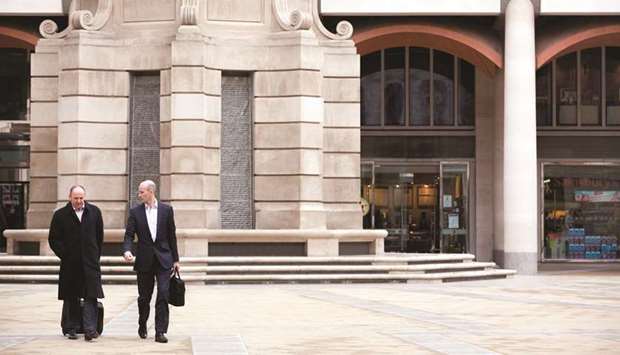Stock markets rallied yesterday as hopes resurfaced that China and the United States could quickly strike a mini trade deal, pending a broader agreement later, dealers said.
“Markets appear to have found some sense of positivity in a week that has seen its fair share of pessimism over the growing feeling the trade talks may have ground to a standstill”, said Joshua Mahony, senior market analyst at IG trading group.
Optimism returned to trading floors after a report said China’s point man on the US tariffs talks had offered to host a meeting to help push through their crucial mini pact.
At the same time, investors were nervous that the deal could collapse at any minute after US lawmakers passed a bill supporting Hong Kong rights, causing anger in Beijing.
Chinese President Xi Jinping yesterday said that China wants to reach an initial trade deal with the United States but is “not afraid” to fight back when necessary and will enact economic reforms at its own pace.
The world’s two biggest economies have been locked in a bruising trade conflict for more than a year, hitting each other with volleys of tariffs on hundreds of billions of dollars worth of goods.
On Thursday, the Wall Street Journal said top negotiator Vice Premier Liu He had invited US counterparts for further discussions to haul the deal over the line.
London was the standout equity performer in Europe yesterday, rising well over 1%, while Frankfurt and Paris advanced more modestly as they had to absorb a sobering set of data showing the eurozone’s economy has almost stalled after successive months of manufacturing decline.
London’s FTSE 100 closed 1.2% up at 7,326.81 points, Frankfurt’s DAX 30 ended 0.2% higher at 13,163.88 points and Paris’ CAC 40 edged 0.2% higher at 5,893.13 points while the EURO STOXX 50 finished adding 0.2% at 3,687.32 points.
IHS Markit said its composite eurozone purchasing managers’ index (PMI) fell to 50.3 points in November, down from a revised 50.6 points last month.
Wall Street was stronger in midday trading after three weak sessions.
The pound slid meanwhile — boosting the London stock market that is dominated by multinationals earning in dollars — as separate IHS Markit PMI figures revealed that UK manufacturing and services output contracted at the fastest rates in 40 months.
Bitcoin, the world’s biggest cryptocurrency, slumped 9% to a six-month low of $6,929 after China’s central bank said it would tackle a resurgence of illegal activities around virtual currencies, cautioning investors not to confuse crypto with blockchain technology.
Oil prices retreated after hitting two-month highs following a Reuters report that the Organisation of the Petroleum Exporting Countries and its allies are likely to extend existing output cuts until mid-2020.
Global benchmark Brent crude was down 0.31% at $63.77 per barrel.
Spot gold edged up 0.2% to $1,467.26 per ounce.
In Frankfurt, Christine Lagarde urged European countries to “innovate and invest” more to support growth amid global uncertainty, in her first major policy speech as president of the European Central Bank.
The eurozone economy is expected to grow by just 1.1% this year, she said, “much lower than previously forecast” as “trade tensions and geopolitical uncertainties” take their toll.
“Markets are being held hostage by news — positive or negative — coming out of the United States or China.
Even if the phase one agreement materialises there is no way I would believe that’s the end of the story, it will just move to German cars or Japanese exports,” said Marie Owens-Thomsen, chief global economist at wealth manager Indosuez.
Concerns linger, with US President Donald Trump expected to sign into law two bills backing protesters in Hong Kong after the US House of Representatives voted 417-1 for the “Hong Kong Human Rights and Democracy Act”, which the Senate had passed unanimously a day earlier.
“If he’s going to be forced to sign it, then it brings another (element) of uncertainty to this phase one trade deal, which then pushes back into next year,” said Matt Simpson, senior market analyst at GAIN Capital in Singapore.
But Simpson said that in the absence of major news on trade, rangebound market moves are “quite reflective of the small headlines coming through”. Chinese blue-chip shares closed 0.82% lower and Asian shares ex-Japan firmed 0.3% after the previous day’s steep falls.
Yields on US and German government bonds were a shade higher.
The failure to resolve the trade spat means the world economy is struggling to recover from its slowdown and the Organisation for Economic Cooperation and Development on Thursday forecast growth at a decade-low 2.9% this year and the next.

Pedestrians walk across Paternoster Square in front of the London Stock Exchange Group headquarters. London’s FTSE 100 closed 1.2% up at 7,326.81 points yesterday.
